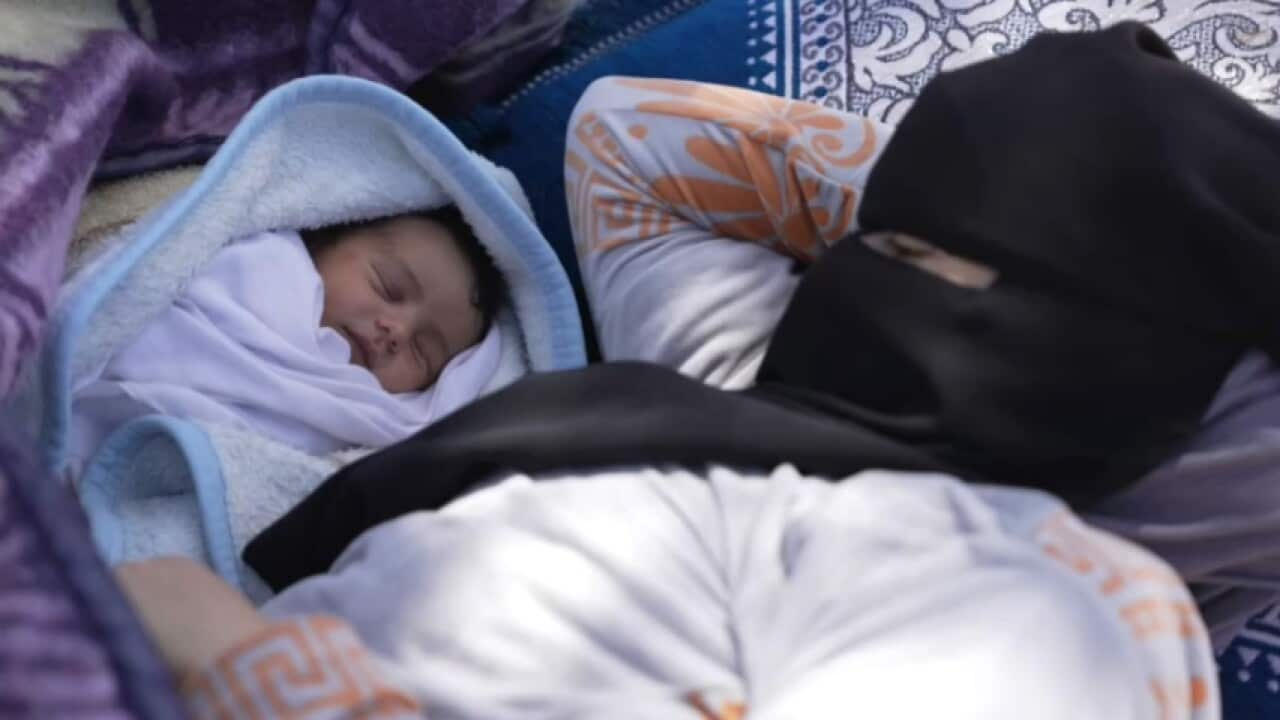Key Points
- The death toll from the 6.8 magnitude quake has risen to 2,901.
- Roads to some devastated mountain villages are still blocked.
- The Albanese government has committed $1 million in humanitarian assistance.
A scared first-time mum lies on the side of the road with her newborn wrapped up in blankets, waiting for help after being forced to leave hospital on Friday night.
For Khadija, the overwhelming joy of giving birth to a girl was shattered by an earthquake which suddenly put her and her newborn in danger.
The quake mere minutes after she delivered her child by C-section, and hospital staff urged her to leave three hours later due to fears of aftershocks.
"A few hours after I gave birth, they (the doctors) said to me, 'Get up, there's an earthquake,'" she told SBS News.
"I was so scared. I was scared for my daughter.
"I got my daughter and I ran."
Khadija has not yet named the four-day-old girl cuddled up to her, with the baby unaware of the chaos that surrounds her.
With her home badly damaged, Khadija seeks the shade of a tree for shelter as aid tents are unbearably hot, especially for an infant.
They're joined by the child's grandmother, who watches over them as they wait for help.
"They told me to go out because it was too hot in the tent. If we stayed, we would have died," the grandmother says.

Residents flee their homes in Moulay Brahim village, near the epicentre of the earthquake, outside Marrakesh, Morocco. Source: AP / Mosa'ab Elshamy
"I can go without food but if my children ask about food I don't know what to say," she told SBS News.
"As it is, they're already in shock from what they saw."
More than 2,900 people have died and over 5,500 people have serious injuries, according to figures released by Morocco's interior ministry on Tuesday.
The 6.8 magnitude earthquake struck the city of Marrakesh and its surrounding towns on Friday night, which was followed twenty minutes later by a 4.9 magnitude aftershock.
The time of the tremor - 11:11pm - means many families and children were in bed as their homes came crumbling down.
It's the deadliest earthquake since 1960, when Agadir on the shore of the Atlantic Ocean was devastated by a 5.8 magnitude tremor that killed at least 12,000 people.
The epicentre of Friday's quake was in the High Atlas Mountains, 71 kilometres southwest of Marrakesh, which is a popular tourist destination.
The remote locations of some of the villages tucked away in the mountainous terrain has made rescue and aid efforts difficult, with many areas only accessible by one road.
Survivors huddled in makeshift shelters, and remain in desperate need of food. Moroccan authorities have come under criticism for accepting limited foreign aid.
Search and rescue efforts on the ground are limited to four countries - the United Kingdom, Qatar, Spain and the United Arab Emirates - despite the United Nations and several others offering assistance.
While there are Australian survivors, the Department of Foreign Affairs and Trade has not reported any Australians killed in the quake to date.
On Wednesday morning, the Albanese government committed $1 million in humanitarian assistance to Moroccan residents devastated by the earthquake.
The funds will help on-ground Red Cross and Red Crescent crews to set up emergency shelters and provide first aid as well as protection and psychological support.
Foreign Minister Penny Wong passed on sympathies on behalf of Australians to all the families and communities impacted by the disaster.
“Australians have been deeply moved by the heartbreaking loss of life and destruction of property in Morocco," she said.
“The Australian government’s emergency assistance will help deliver crucial supplies to those most in need.
“Our thoughts are with all those affected, including the Australian-Moroccan community.”


